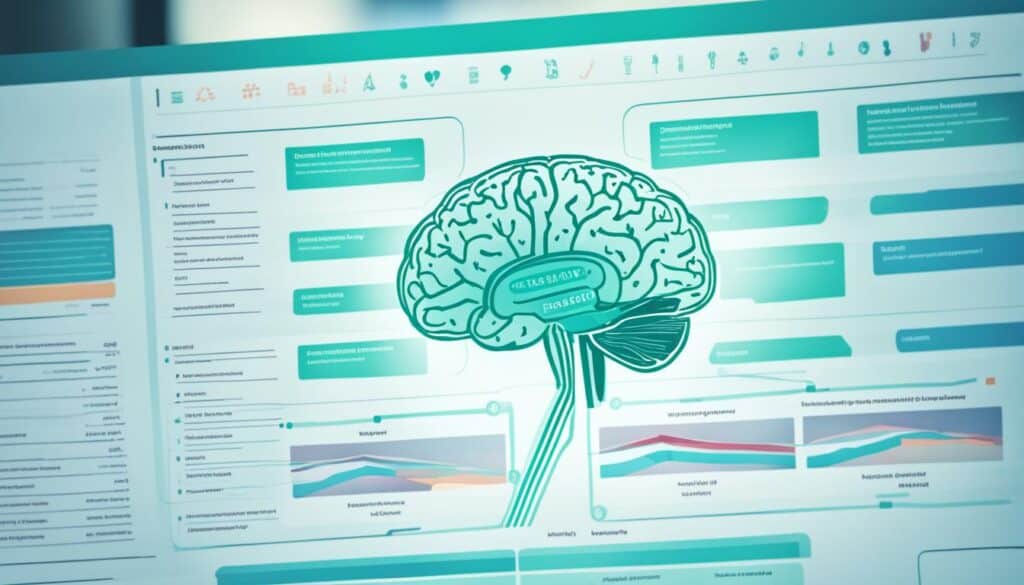The field of technology offers a wide range of opportunities for those interested in pursuing a bachelor’s degree. With the rapidly evolving tech industry, a bachelor of technology degree can unlock your potential and lead to a dynamic career. According to the Bureau of Labor Statistics, jobs in information security and data analytics are projected to grow significantly in the coming years, making these areas of study particularly appealing. Completing a bachelor’s degree program in technology can provide the knowledge and skills needed to excel in these in-demand fields.
Key Takeaways:
- A bachelor of technology degree paves the way for exciting career opportunities in the tech industry.
- The fields of information security and data analytics are experiencing rapid growth.
- Completing a bachelor’s degree in technology equips you with the knowledge and skills necessary for in-demand tech roles.
- Technology degrees offer a solid foundation for a rewarding career path in various industries.
- Stay ahead of the curve by exploring the wide array of bachelor of technology programs available.
Cybersecurity
In today’s increasingly digital world, cybersecurity plays a vital role in protecting sensitive information and ensuring the integrity of computer networks. A bachelor’s degree in cybersecurity is designed to equip students with the knowledge and skills necessary to safeguard these systems from cyber threats.
Also Read : Advancing Your Game with Sports Technology
As organizations rely more on technology, the demand for skilled cybersecurity professionals continues to grow. According to the Bureau of Labor Statistics, employment for information security analysts is projected to increase by 32% over the next decade, with a particular emphasis on cybersecurity.
Also Read : Computer Technology Trends for a Digital Future
This degree program focuses on developing a strong understanding of systems thinking, security principles, and adaptive incident response tactics. Students learn how to identify vulnerabilities, implement protective measures, and respond effectively to cyberattacks. By understanding the motivations and tactics of hackers, information security analysts can develop effective strategies to mitigate risks and protect valuable data.
Also Read : Top Universities for Engineering Excellence
Upon completion of a cybersecurity degree program, graduates can pursue a variety of career paths. Some may choose to work directly with organizations as information security analysts, responsible for analyzing security measures and implementing countermeasures. Others may explore roles as cybersecurity consultants, helping businesses develop comprehensive security strategies and protocols. Additionally, government agencies and law enforcement organizations are always in need of cybersecurity professionals to protect critical infrastructure and investigate cybercrimes.
Also Read : Embrace the Future with Business Technology
Key Skills and Topics Covered in a Cybersecurity Degree Program
- Network security
- Cryptography and encryption
- Forensics and incident response
- Security policies and procedures
- Secure coding and software development
- Threat intelligence and analysis
- Ethical hacking and penetration testing
A cybersecurity degree program provides a comprehensive education that encompasses both technical skills and a deep understanding of the ethical and legal implications of cybersecurity. Graduates are equipped to assess risks, develop policies, and implement effective security measures to protect valuable information.
Also Read : Understanding What Is Surgical Technology
Are you ready to embark on a rewarding career in cybersecurity? A degree in cybersecurity can open doors to exciting opportunities in a rapidly growing industry. Take the first step towards a dynamic and fulfilling career by enrolling in a cybersecurity degree program today!
Data Analytics
The explosion of information in today’s world has made data analysis a crucial skill for businesses. A bachelor’s degree in data analytics equips students with the ability to collect, organize, and analyze data to uncover valuable insights. Graduates of this program can pursue careers as data analysts, helping organizations make informed decisions based on data-driven strategies.
Data analysts play a vital role in transforming raw data into actionable information. They employ various statistical techniques and data visualization tools to uncover patterns, trends, and correlations. By examining and interpreting complex data sets, they provide valuable insights that drive business growth and inform decision-making processes.
With the increasing demand for skilled data analysts, a bachelor’s degree in data analytics offers numerous career opportunities. This field is particularly relevant in industries such as finance, marketing, healthcare, and technology, where data-driven decision making is critical.
The Importance of a Data Analytics Degree
A bachelor’s degree in data analytics provides a solid foundation in both theoretical and practical aspects of data analysis. Students gain proficiency in statistical analysis software, programming languages, and data management principles. They also develop skills in data visualization, data mining, machine learning, and predictive modeling.
Through hands-on projects and industry collaborations, students apply their knowledge to real-world datasets and business scenarios. They learn to identify business problems that can be solved through data analysis, extract relevant data, and apply appropriate analytical techniques to draw meaningful conclusions.
“Data analytics is the art and science of analyzing data to make informed decisions.”
An interdisciplinary approach to data analytics allows students to understand the intersection of data analysis and other fields, such as finance, marketing, and healthcare. This holistic understanding enables data analysts to provide valuable insights in specific industry contexts.
The Data Analytics Curriculum
A typical bachelor’s degree program in data analytics includes a combination of core courses, electives, and hands-on projects. The curriculum covers a wide range of topics such as:
- Data collection and database management
- Statistical analysis and predictive modeling
- Data visualization and storytelling
- Machine learning and artificial intelligence
- Business intelligence and decision support systems
- Ethics and privacy in data analytics
Additionally, students may have the opportunity to specialize in specific areas of data analytics, such as:
- Big data analytics
- Marketing analytics
- Healthcare analytics
- Financial analytics
- Supply chain analytics
These specializations allow students to deepen their knowledge and skills in areas that align with their interests and career goals.

| Career Paths | Job Responsibilities | Salary Range |
|---|---|---|
| Data Analyst | Collect, clean, and analyze data to provide insights and recommendations to support decision-making processes | $60,000 – $110,000 per year |
| Data Scientist | Develop and implement advanced analytical models and algorithms to solve complex business problems | $80,000 – $150,000 per year |
| Business Intelligence Analyst | Design and build data visualizations and reports to support strategic decision-making within organizations | $70,000 – $120,000 per year |
A career in data analytics offers growth opportunities and competitive salaries. Data analysts can work in diverse industries, including finance, healthcare, retail, government, and technology. They can also pursue advanced degrees, such as a Master’s in Business Administration or a Ph.D. in data analytics, to further enhance their expertise.
Whether you’re passionate about uncovering insights hidden within data, helping businesses make data-driven decisions, or contributing to innovative solutions, a bachelor’s degree in data analytics can provide the foundation for a rewarding career in the ever-expanding field of data analysis.
Computer Programming
Computer programmers play a critical role in various industries, including web and software development, database administration, and data security. A bachelor’s degree in computer programming provides students with the skills necessary to design, create, and test code for software applications and operating systems. This program emphasizes learning popular programming languages, such as Java, Python, C++, and JavaScript, preparing graduates for careers as software developers, database developers, and systems software developers.
In today’s interconnected world, computer programming is the backbone of technological advancements. It is the art of communicating with computers through a series of instructions, enabling them to perform specific tasks efficiently. Whether it’s designing a user-friendly mobile app, optimizing database systems, or enhancing data security, computer programming is essential for creating innovative solutions in the digital landscape.
Programmers utilize a variety of programming languages to bring their ideas to life. Each language has its own syntax, rules, and capabilities, making it suitable for different applications. Here are some of the most widely used programming languages and their respective domains:
- Java: Renowned for its versatility, Java is commonly used for developing desktop, web, and mobile applications. It powers popular platforms like Android and offers robust features for object-oriented programming.
- Python: Known for its simplicity and readability, Python is widely used in fields such as data analysis, artificial intelligence, and web development. Its extensive libraries and frameworks make it a favorite among programmers.
- C++: Considered a powerful and efficient language, C++ is often used to create high-performance applications, game engines, and system software. It provides low-level control and is a popular choice for resource-intensive projects.
- JavaScript: Primarily used for web development, JavaScript enables interactivity and dynamic content on websites. It is the backbone of modern web applications and is often combined with HTML and CSS to create engaging user experiences.
Proficiency in these programming languages opens doors to a variety of job opportunities. Software developers, also known as software engineers, play a crucial role in designing, implementing, and maintaining software applications. They collaborate with clients, stakeholders, and other members of the development team to ensure the successful delivery of projects.
“Good software, like good wine, takes time.”
Software developers work in diverse industries, ranging from technology startups to large corporations. They are responsible for translating user needs into functional code, debugging and fixing issues, and continuously improving software performance. With advancements in cloud computing, artificial intelligence, and mobile technology, the demand for skilled software developers continues to grow.

Skills Required for Computer Programming
To succeed as a computer programmer, individuals must possess a combination of technical skills and problem-solving abilities. Here are some essential skills required in the field:
- Strong analytical and logical thinking
- Proficiency in programming languages
- Attention to detail for writing error-free code
- Ability to work both independently and collaboratively
- Experience with software development methodologies
- Knowledge of data structures and algorithms
- Effective communication and documentation skills
Computer programming is a constantly evolving field, requiring professionals to stay up-to-date with the latest industry trends and technologies. Continuous learning and adaptability are crucial for success, as programmers must be able to quickly grasp new concepts and apply them to their projects.
Career Outlook for Computer Programming
The demand for skilled computer programmers remains strong, as organizations across industries rely on technology for their operations. According to the Bureau of Labor Statistics, the employment of software developers is projected to grow by 22% from 2019 to 2029, much faster than the average for all occupations.
With a bachelor’s degree in computer programming, graduates can pursue various career paths, including:
| Job Title | Median Annual Salary |
|---|---|
| Software Developer | $110,140 |
| Database Developer | $93,750 |
| Systems Software Developer | $110,000 |
As technology continues to advance, the need for skilled programmers will persist. From developing cutting-edge applications to securing digital infrastructures, the opportunities for computer programmers are vast and ever-expanding.
Software Development
Software development is a dynamic field that focuses on the design and creation of software. With the increasing reliance on technology in various industries, software developers play a crucial role in developing innovative solutions to meet the evolving needs of businesses and users.
A bachelor’s degree in software development provides students with a comprehensive understanding of the software development process and equips them with the necessary skills to excel in this field. The curriculum typically includes courses in software engineering, business systems analysis, software testing, and more.
One of the key benefits of pursuing a software development degree program is the high demand for skilled software engineers in the job market. As organizations across industries embrace digital transformation, the need for software developers continues to grow rapidly. According to the Bureau of Labor Statistics, employment of software developers is projected to grow 22 percent from 2019 to 2029, much faster than the average for all occupations.
Software engineers have the opportunity to work on diverse projects, ranging from mobile applications to enterprise software systems. They collaborate with other professionals, such as project managers, designers, and quality assurance engineers, to deliver high-quality software solutions.
Additionally, software development offers excellent career prospects and competitive salaries. According to PayScale, the median annual salary for software engineers in the United States is $87,000, with top earners making over $130,000 per year.
Here is an overview of the skills and knowledge typically covered in a software development degree program:
- Software engineering principles and methodologies
- Programming languages such as Java, C++, Python, and JavaScript
- Database design and management
- Software testing and quality assurance
- Web development technologies and frameworks
- Mobile app development
- Algorithm analysis and design
- Software project management
Software development is a rapidly evolving field, requiring professionals to stay up to date with the latest advancements and practices. Continuing education, certifications, and participation in industry events and communities can help software engineers enhance their skills and remain competitive in the job market.
Whether it’s developing cutting-edge applications, creating solutions to complex problems, or contributing to the growth of technology-driven organizations, a software development degree equips graduates with the foundation to thrive in this exciting and in-demand field.

| Pros of Software Development | Cons of Software Development |
|---|---|
| High demand for skilled software developers | Constant need to keep up with evolving technologies |
| Opportunity to work on diverse and innovative projects | The complexity of managing large-scale software development projects |
| Competitive salaries and career growth potential | May require long hours and tight deadlines during project development |
| Continual learning and professional development opportunities | Highly competitive job market |
Computer Networking
A bachelor’s degree in computer networking prepares students for careers in designing, configuring, and managing complex computer networks. This program covers topics such as IT security, network infrastructures, and data delivery. Graduates of this program can pursue careers as network support specialists, computer systems analysts, and computer network architects. The Bureau of Labor Statistics reports that computer network architects earn an average salary of $129,490 per year, making this a lucrative field to consider.
Skills Learned in a Computer Networking Degree Program:
- Designing and implementing network infrastructures
- Configuring routers, switches, and other networking devices
- Monitoring and troubleshooting network performance issues
- Implementing IT security measures to protect network resources
- Collaborating with other IT professionals to ensure network functionality
“Computer networking professionals play a critical role in ensuring the smooth operation of computer networks, which are essential for businesses and organizations to function efficiently in today’s digital age.”
As a network support specialist, you will be responsible for providing technical assistance to end-users and maintaining network systems. This role requires a strong understanding of network protocols, troubleshooting techniques, and customer service skills. Computer systems analysts, on the other hand, focus on evaluating and improving existing network infrastructures to meet the evolving needs of organizations. They analyze data communication systems, design solutions, and recommend hardware and software upgrades.
Computer network architects are responsible for designing and implementing large-scale network solutions. They collaborate with clients, engineers, and other stakeholders to develop network blueprints that meet specific requirements. This role requires a deep understanding of network architecture, security protocols, and emerging technologies.

| Career Path | Job Responsibilities | Average Salary |
|---|---|---|
| Network Support Specialist | Provide technical assistance, troubleshoot network issues, maintain network systems | $64,892 per year |
| Computer Systems Analyst | Evaluate and improve network infrastructures, analyze data communication systems | $93,730 per year |
| Computer Network Architect | Design and implement network solutions, collaborate with clients and stakeholders | $129,490 per year |
With the increasing reliance on technology and data, the demand for computer networking professionals is expected to grow. Organizations across sectors, including healthcare, finance, and technology, rely on secure and efficient networks to operate effectively. As a computer networking specialist, you can play a crucial role in supporting these organizations and ensuring their networks are reliable, scalable, and secure.
Health Information Management (HIM)
The healthcare industry heavily relies on information technology for the delivery of modern healthcare. A bachelor’s degree in health information management prepares students to manage healthcare data, comply with regulations and accreditation standards, and ensure the confidentiality and privacy of health information.

Graduates of this program can pursue careers as health technologists, technicians, and information specialists. The demand for these professionals is expected to rise by 17% in the coming years, according to the Bureau of Labor Statistics.
| Career | Average Salary |
|---|---|
| Health Technologist | $60,890 per year |
| Health Information Technician | $46,590 per year |
| Health Information Specialist | $44,090 per year |
With the increasing digitization of healthcare records and the emphasis on compliance with regulation and accreditation, professionals in health information management play a vital role in maintaining the integrity and security of patient data.
Information Technology – General Degree
For those who are unsure about which specialization in IT to choose, a general information technology degree can provide a broad foundation of knowledge. This program covers various IT topics, allowing students to explore different specialties and choose electives based on their interests. Earning a bachelor’s degree in information technology can qualify graduates for entry-level jobs in the field and provide a pathway for future specialization through certifications and higher education opportunities.
Exploring Different IT Specialties
A general information technology degree offers students the opportunity to delve into various IT disciplines and gain a comprehensive understanding of the field. Core courses typically cover fundamental topics such as computer systems, programming, networking, and database management. Furthermore, students have the flexibility to choose elective courses that align with their interests and helps them explore different specialties within IT.
During their studies, students can explore areas such as cybersecurity, data analytics, software development, computer networking, and more. By gaining exposure to these different fields, students can discover their areas of interest and determine which specialization they may want to pursue further.
A Pathway to Entry-Level IT Jobs
Earning a bachelor’s degree in information technology can open up entry-level job opportunities in various sectors. Graduates with a general IT degree may find employment as IT support specialists, systems analysts, network administrators, or database administrators. These positions provide valuable hands-on experience and serve as a stepping stone for career progression in specific IT disciplines.
By gaining industry experience in entry-level roles, IT professionals can better understand their strengths and interests, which can guide them towards pursuing further specialization or advanced certifications in their chosen field.
Specialization and Career Growth
While a general information technology degree provides a broad foundation, professionals in the field often pursue further specialization to enhance their career prospects. IT certifications, such as those offered by industry-leading organizations like Cisco, Microsoft, and CompTIA, can help individuals focus their expertise in specific areas such as network security, cloud computing, or data analysis. These certifications can lead to higher-paying job opportunities and career advancements.
Additionally, some individuals may choose to pursue advanced degrees, such as a Master’s in Information Technology or an MBA with a technology focus. These higher-level qualifications can open doors to leadership roles, such as IT management or project management positions, offering increased salary potential and career growth opportunities.
Job Market Insights
The job market for graduates with bachelor’s degrees in technology is promising. With the rapid advancement of technology and the increasing reliance on digital solutions across industries, there is a growing demand for skilled professionals in various technology careers. From cybersecurity to data analytics, IT jobs offer diverse opportunities for individuals looking to build a successful career in the field.
The Bureau of Labor Statistics predicts strong growth in key technology sectors, creating a favorable job market for graduates with specialized skills. Let’s take a closer look at some of these technology careers and their earning potential:
Cybersecurity
Cybersecurity professionals play a crucial role in protecting computer networks and data from cyber threats. With the rise in cyberattacks and data breaches, organizations are increasingly investing in cybersecurity measures. The demand for information security analysts is projected to grow by 32%, creating ample job opportunities in the field. The median annual salary for information security analysts is $103,590, highlighting the high earning potential in this technology career.
Data Analytics
Data analytics is a rapidly evolving field that focuses on extracting valuable insights from large datasets. As businesses rely more on data-driven decision-making, the need for skilled data analysts continues to grow. The Bureau of Labor Statistics projects a 31% increase in jobs for operations research analysts, which includes data analysts. The median annual salary for data analysts is $83,610, making it a lucrative technology career choice.
Software Development
Software development is a highly sought-after profession, with a growing need for skilled software engineers. From mobile applications to complex software systems, software developers are the driving force behind technological innovation. The Bureau of Labor Statistics estimates a 22% increase in jobs for software developers, with a median annual salary of $110,140. This technology career offers both creativity and competitive compensation.
Other technology careers, such as computer networking, artificial intelligence, and cloud computing, also hold promising job prospects in the ever-expanding IT industry.
| Technology Career | Projected Job Growth | Median Annual Salary |
|---|---|---|
| Cybersecurity | 32% | $103,590 |
| Data Analytics | 31% | $83,610 |
| Software Development | 22% | $110,140 |
These job market insights highlight the promising future of technology careers and the increasing demand for IT professionals. Pursuing a bachelor’s degree in a technology-related field can provide the necessary skills and knowledge to thrive in the job market and build a successful career in the ever-evolving world of technology.

Admissions and Degree Requirements
Each bachelor’s degree program in technology has specific admissions and degree requirements. Prospective students considering pursuing a degree in technology should familiarize themselves with these requirements to ensure a smooth application and enrollment process.
Admissions Requirements
Admissions requirements for a bachelor’s degree program in technology typically include:
- A strong background in mathematics
- Basic programming skills
- Meeting the minimum GPA requirement, usually ranging from 2.5 to 3.0
- Submission of standardized test scores, such as the SAT or ACT
- Letters of recommendation
- Personal statement or essay
It is important for prospective students to carefully review the specific admissions requirements of each program they are interested in. Some programs may have additional requirements or prerequisites.
Degree Requirements
Once admitted into a bachelor’s degree program in technology, students must fulfill certain degree requirements to graduate. These requirements typically include:
- Completion of core courses
- Specialized coursework in the chosen field
- Elective credits
Some programs may also require students to complete internships or capstone projects, providing practical experience and enhancing their skills in preparation for their future careers.
Also Read : Advancing Your Game with Sports Technology
Example Table: Bachelor of Technology Degree Requirements
table {
width: 100%;
margin-bottom: 20px;
border-collapse: collapse;
}
th, td {
padding: 8px;
text-align: left;
border-bottom: 1px solid #ddd;
}
th {
background-color: #f2f2f2;
}
| Program | Admissions Requirements | Degree Requirements |
|---|---|---|
| Bachelor of Technology in Cybersecurity | GPA: 2.5 or higher SAT/ACT scores Letters of recommendation |
Core courses in cybersecurity Specialized coursework in network security, cryptography, incident response Elective credits |
| Bachelor of Technology in Data Analytics | GPA: 3.0 or higher SAT/ACT scores Personal statement |
Core courses in data analysis Specialized coursework in data mining, statistical analysis, data visualization Internship or capstone project |
| Bachelor of Technology in Software Development | GPA: 2.8 or higher Basic programming skills Letters of recommendation |
Core courses in software engineering Specialized coursework in programming languages, software testing, software project management Elective credits |

Prospective students should note that the specific admissions and degree requirements may vary based on the program and institution. It is crucial to research and consult with admissions advisors to ensure understanding and compliance with all requirements.
Conclusion
Bachelor of technology degrees offer a wide range of career opportunities in the ever-evolving field of IT. Whether you are interested in cybersecurity, data analytics, software development, or computer networking, these degrees provide a solid foundation of knowledge and skills that are in high demand.
Graduates of technology degree programs can look forward to competitive salaries and job security, thanks to the strong growth projections in the IT field. The Bureau of Labor Statistics predicts significant increases in job opportunities for professionals with these qualifications.
Pursuing a bachelor’s degree in technology not only equips you with the necessary expertise, but it also opens doors to exciting career paths in various industries. From safeguarding organizations against cyber threats to analyzing data for valuable insights, the possibilities are vast.
If you have a passion for technology and are seeking a rewarding career, consider investing in your future with a bachelor’s degree in technology. It is a gateway to a world of endless career opportunities and a solid foundation for lifelong learning in the ever-expanding IT industry.
FAQ
Q: What is a Bachelor of Technology degree?
A: A Bachelor of Technology degree is an undergraduate academic program that focuses on the practical aspects of technology and engineering.
Q: What is the difference between a Bachelor of Science in Engineering and a Bachelor of Engineering degree?
A: A Bachelor of Science in Engineering degree typically involves a broader focus on the science and theory behind engineering, while a Bachelor of Engineering degree focuses more on practical application and hands-on experience.
Q: Can you pursue a Bachelor of Technology degree in India?
A: Yes, several universities and colleges in India offer Bachelor of Technology programs in various engineering disciplines.
Q: What is the duration of a Bachelor of Technology degree?
A: A Bachelor of Technology degree is typically a four-year undergraduate program.
Q: What subjects are typically covered in a Bachelor of Technology program?
A: Subjects covered in a Bachelor of Technology program may include computer science, engineering and technology, mechanical engineering, mathematics, and related fields.
Q: What is a Bachelor of Technology degree?
A: A Bachelor of Technology degree is an undergraduate program that focuses on technology and its practical applications. It is commonly offered in fields such as engineering, computer science, and information technology.
Q: What is the difference between a Bachelor of Science and a Bachelor of Science in Engineering degree?
A: A Bachelor of Science degree typically emphasizes a broader curriculum in scientific principles, while a Bachelor of Science in Engineering degree focuses more on the application of those principles in the field of engineering.
Q: How long does it take to complete a Bachelor of Technology degree?
A: A Bachelor of Technology degree is usually a four-year undergraduate program, but the duration may vary depending on the country and the specific program requirements.


